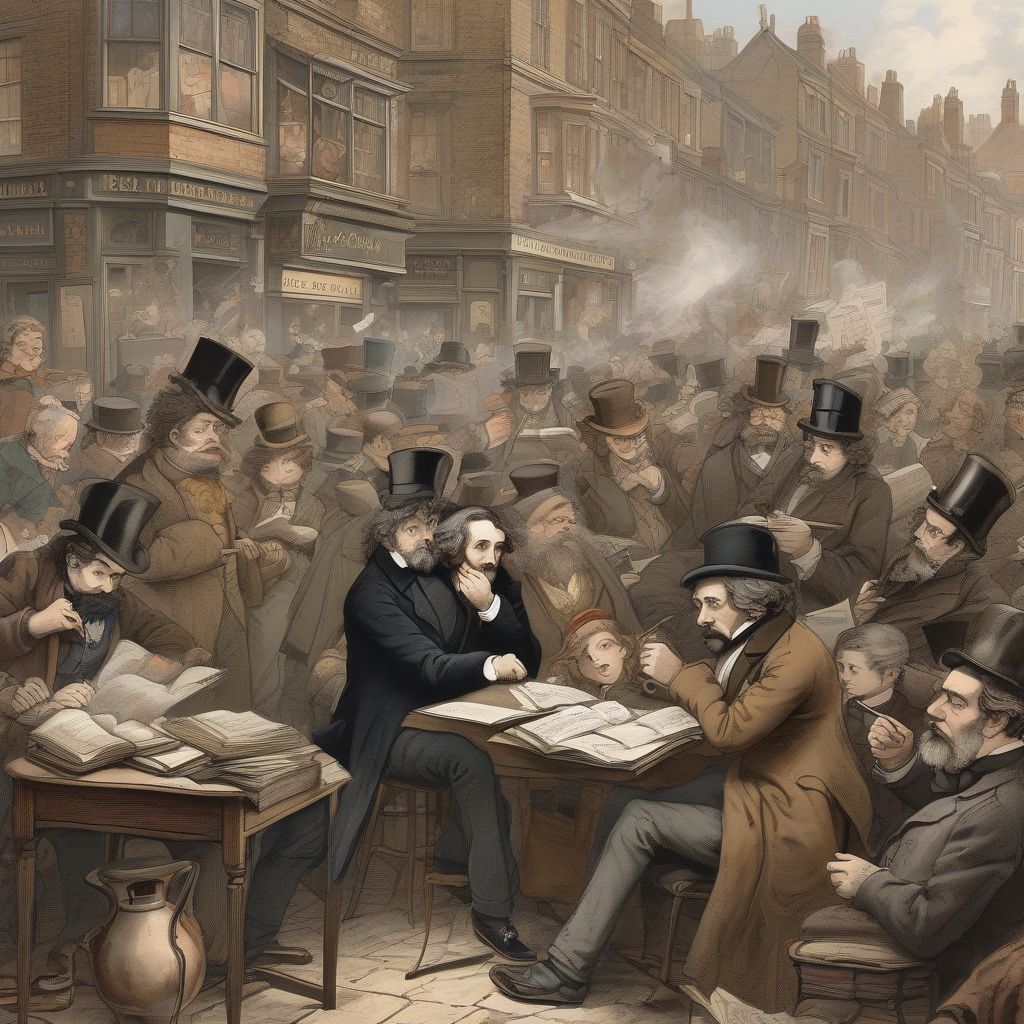Imagine stepping back in time to Victorian England – a world of stark contrasts, where immense wealth coexisted with abject poverty. A world grappling with rapid industrialization, social inequalities, and a rigid class system. In this tumultuous era, one voice emerged, capturing the hearts and minds of the nation, and ultimately, shaping the very fabric of society: Charles Dickens. His impact transcended mere entertainment; it ignited social reform, sparked conversations, and left an indelible mark on Victorian England and beyond.
Dickens’ Mirror to Victorian Society
Dickens’ novels weren’t just stories; they were vivid portrayals of Victorian life, reflecting its complexities, contradictions, and challenges. His keen observations and masterful storytelling brought to life the stark realities of the time, from the bustling streets of London to the grim realities of workhouses and prisons. Through characters like Oliver Twist, we glimpsed the horrors of child labor and the desperation of the poor. With Ebenezer Scrooge, we witnessed the dehumanizing effects of greed and the potential for redemption. Dickens’ writing served as a powerful mirror, reflecting back to Victorian society its own triumphs and failings.
The Power of Social Commentary
Unlike many authors of his time, Dickens didn’t shy away from addressing sensitive social issues. He tackled poverty, child labor, education, the legal system, and the plight of the working class head-on. His novels weren’t simply entertaining narratives; they were powerful indictments of social injustice, sparking public discourse and demanding change. “Bleak House,” for instance, exposed the complexities and corruption of the legal system, while “Hard Times” critiqued the dehumanizing effects of industrialization. Dickens’ ability to weave compelling narratives around these issues made his social commentary both accessible and impactful.
A Voice for the Voiceless
Dickens gave a voice to those often marginalized and ignored by society. His characters, drawn from all walks of life, resonated with readers from different social strata. He depicted the struggles of the working class with empathy and understanding, humanizing their experiences and challenging the prevailing social hierarchies. Through characters like Pip in “Great Expectations,” Dickens explored the complexities of social mobility and the illusions of class aspirations. His portrayal of the marginalized not only brought their struggles to light but also fostered a sense of shared humanity.
Shaping Public Opinion and Inspiring Reform
Dickens’ influence extended beyond the realm of literature. His novels played a significant role in shaping public opinion and inspiring social reform. The vivid depictions of poverty and injustice in his works galvanized public support for various social causes. For example, the publication of “Oliver Twist” is believed to have contributed to reforms in the workhouse system and child labor laws. Dickens’ ability to connect with a broad audience, from the working class to the aristocracy, made him a powerful force for social change.
The Rise of Serialization and its Impact
Dickens’ novels were often published in serialized form, appearing in weekly or monthly installments. This format allowed his stories to reach a wider audience, including those who couldn’t afford to purchase entire books. The anticipation and ongoing discussion surrounding each installment further amplified his impact on Victorian society, turning his novels into national events. This serialized format also allowed Dickens to respond to public feedback and incorporate contemporary issues into his ongoing narratives, making his work even more relevant and engaging.
A Literary Legacy that Endures
Charles Dickens’ influence continues to resonate today. His works are studied in schools and universities worldwide, and his characters remain instantly recognizable. He is considered one of the greatest novelists in the English language, and his contributions to literature and social reform are undeniable. His insightful portrayals of Victorian society provide valuable historical context, while his timeless themes of compassion, social justice, and the human spirit continue to inspire and challenge readers across generations.
 Charles Dickens' Impact on Victorian Society
Charles Dickens' Impact on Victorian Society
Conclusion
Charles Dickens’ impact on Victorian society was profound and far-reaching. He wasn’t just a storyteller; he was a social commentator, a reformer, and a voice for the voiceless. His novels served as a mirror to Victorian society, reflecting its complexities and challenges while inspiring change and sparking conversations that continue to this day. From the horrors of child labor to the complexities of the legal system, Dickens tackled sensitive social issues with unmatched skill and empathy. His ability to connect with a broad audience through compelling narratives and memorable characters made him a powerful force for social reform. Dickens’ legacy extends far beyond the realm of literature. He helped shape public opinion, inspire social change, and leave an indelible mark on Victorian England and the world. We invite you to share your thoughts on Dickens’ impact and explore further resources on our site dedicated to classic literature and its reflection of societal values.



